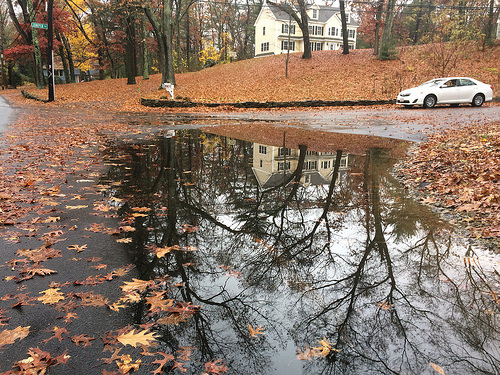February 6, 2017
According to the Bible, water is both the fountain of life and a destroyer by flood. Water naturally plots its own course, creating wetlands to store excess storm water. Human development, for better or worse, seeks to maximize the value of property and minimize land set aside for natural wetlands or artificial drainage purposes. The proximity of water can enhance or damage the value of real estate. For example, waterfront properties tend to fetch higher sale values. Sometimes neighbors will improperly channel water off their own land onto that of another in an effort to fend off unwanted surface water diversion. Lawyers and judges describe unwanted surface water as a “common enemy” because both neighbors seek to avoid it. The common law tradition developed a system of rules whereby judges can resolve disputes between neighbors over the reasonableness of surface water diversion.
Sometimes it is not a family or business that owns the uphill parcel that is diverting surface water. A property owner might find herself contending with a governmental or community association neighbor in a surface water diversion dispute. In a recent Southwest Virginia lawsuit, owner Consortium Systems, LLC sued two contractors, Lane Engineering, Inc. & W-L Construction & Paving, Inc. who constructed a sediment pond on a neighboring technology park owned by Scott County Economic Development Authority (“County EDA”). Rural counties like to build technology parks to attract out of town businesses to relocate there. Consortium alleged that the EDA’s contractors built the sediment pond without a proper outlet or outfall.
Owning property beside a public or private common area can be an advantage or a risk. Businesses want to locate themselves near parking, amenities and potential sources of customers or vendors. However, if a dispute arises between an owner and a governmental neighbor, the private party may find themselves facing additional legal obstacles. Sometimes governmental entities enjoy sovereign immunity, shortened lawsuit filing deadlines or additional notice procedures. Consortium tried to sue the contractors for negligence, trespass and negligent surface water diversion. The owner argued that the contractors should be liable to damage to neighboring properties because they faultily constructed the drainage facilities on the County EDA property. In his January 9, 2017 ruling on the contractors’ pretrial motions, Judge John C. Kilgore made findings illustrating an owner’s challenges to sue its neighbor’s contractors:
- Common Enemy Doctrine. Because surface water must go somewhere in developed areas, the common law tradition allows neighboring owners to “fight off” the “common enemy” onto neighboring parcels. Virginia, like many states, has an exception requiring surface water diversion to be done, “reasonably and in good faith and not wantonly, unnecessarily or carelessly.” Virginia courts find improper surface water diversion where the neighbor collects water into an artificial channel and redirects it onto someone else’s land.
- Sovereign Immunity. Virginia counties enjoy the sovereign immunity of the commonwealth. Municipal corporations are also entitled to sovereign immunity when exercising governmental functions. This immunity extends to contractors working for a governmental body. However, sovereign immunity does not protect the negligent performance of the government’s contractor. Judge Kilgore found the Economic Development Authority’s construction of the technology park to enjoy sovereign immunity without discussion in his opinion letter. Consortium’s negligence claims had been previously dismissed.
- Who is Responsible, the Neighbor or their Contractor? Judge Kilgore observed that the two defendants, Lane & W-K were working on behalf of the EDA. Generally speaking, the owner of a neighboring parcel is responsible for the acts of its representatives and contractors. The Court did not find authority for holding the neighbor’s contractor liable for the surface water diversion, in this situation.
The court previously dismissed Consortium’s claims for negligence as not being timely brought. In its January 2017 ruling, Judge Kilgore dismissed Consortium’s other claims, which were for trespass and diversion of surface water as barred by sovereign immunity.
The Consortium Systems, LLC v. Lane Engineering, Inc. case contains several surface water diversion takeaways in addition to the judge’s legal rulings. First, when flooding occurs, the suffering owner should investigate the causes and potential remedies for the drainage problem. Sometimes the answer is not obvious. In serious cases, this may require the assistance of an engineer or other expert. Second, all flooding problems should be addressed promptly before additional damage occurs. If a neighbor is to blame, they should be notified promptly. Third, the law may apply a standard of care that is different from what may appear as ground water diversion best-practices. The flooded owner or her attorney may need to consult HOA documents, covenants, deed restrictions, easements, county storm water management guidelines, state case law and other authorities to determine the parties’ relative rights and responsibilities.
Case Citation:
Consortium Systems, LLC v. Lane Engineering, Inc., 2017 Va. Cir. Lexis 2 (Lee Co., Jan. 9, 2017).
Photo Credit:
KevinsImages New 2016 drainage Juniper rd. via photopin (license)(does not depict any facts discussed in blog post)


